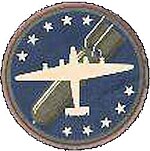55th Fighter Wing: Difference between revisions
→History: edited and expanded |
edited and expanded |
||
| Line 41: | Line 41: | ||
Assigned to [[Fifteenth Air Force]], being stationed at [[Bari]], Italy and was inactivated on 9 September 1945. |
Assigned to [[Fifteenth Air Force]], being stationed at [[Bari]], Italy and was inactivated on 9 September 1945. |
||
===Air National Guard=== |
|||
Allotted to the [[Ohio Air National Guard]], on 24 May 1946 and re-designated as the 55th Fighter Wing. It was organized at [[Lockbourne Army Airfield]], Columbus, Ohio, and was extended federal recognition on 7 December 1947 by the [[National Guard Bureau]]. |
|||
Allocated to the [[Ohio Air National Guard]] for command and control origination for units in the Ohio River Valley region of the United States. Extended federal recognition and activated on 21 August 1946. |
|||
At the end of October 1950, the Air National Guard converted to the wing-base (Hobson Plan) organization. As a result, the wing was withdrawn from the Ohio ANG and was inactivated on 31 October 1950. The [[121st Fighter Wing]] was established by the [[National Guard Bureau]], allocated to the state of Ohio, recognized and activated 1 November 1950; assuming the personnel, equipment and mission of the inactivated 55th Fighter Wing. |
|||
Controlled Ohio Air National Guard units, inactivated on 31 October 1950. Personnel, assigned units and mission assumed by [[121st Fighter Wing]]. |
|||
===Lineage=== |
===Lineage=== |
||
Revision as of 18:55, 11 December 2012
| 55th Fighter Wing | |
|---|---|
 F-51D-25-NA Mustang (s/n 44-73348) from the 162d Fighter Squadron, Ohio Air National Guard | |
| Active | 1943–1945; 1947-1950 |
| Country | |
| Branch | |
| Type | Wing |
| Role | Command and Control |
| Part of | Ohio Air National Guard |
| Engagements |
|
| Insignia | |
| Emblem of the 55th Bomb Wing |  |
The 55th Fighter Wing (55 FW) is a disbanded unit of the United States Air Force, last stationed at Lockbourne Air Force Base, Columbus, Ohio. It was withdrawn from the Ohio Air National Guard (OH ANG) and inactivated on 31 October 1950.
This wing is not related to the United States Air Force 55th Strategic Reconnaissance Wing or subsequent units that was constituted on 29 June 1948 and activated on 19 July 1948.
History
Established in early 1943 as an intermediate-level command and control organization. Initially was a Third Air Force training unit at McDill Field, Florida, with responsibility for B-26 Marauder training by III Bomber Command.
Assigned to Fifteenth Air Force, being stationed at Bari, Italy and was inactivated on 9 September 1945.
Air National Guard
Allocated to the Ohio Air National Guard for command and control origination for units in the Ohio River Valley region of the United States. Extended federal recognition and activated on 21 August 1946.
At the end of October 1950, the Air National Guard converted to the wing-base (Hobson Plan) organization. As a result, the wing was withdrawn from the Ohio ANG and was inactivated on 31 October 1950. The 121st Fighter Wing was established by the National Guard Bureau, allocated to the state of Ohio, recognized and activated 1 November 1950; assuming the personnel, equipment and mission of the inactivated 55th Fighter Wing.
Lineage
- Constituted as 55th Bombardment Operational Training Wing (Medium) on 17 March 1943
- Activated on 31 March 1943
- Re-designated 55th Bombardment Wing (Medium) in October 1943
- Re-designated 55th Bombardment Wing (Heavy) in December 1943
- Inactivated 9 September 1945.
- Re-designated 55th Fighter Wing, and allotted to the Ohio ANG on 21 August 1946
- Extended federal recognition and activated on 7 December 1947
- Inactivated, and returned to the control of the Department of the Air Force, on 31 October 1950
- Disbanded on 15 June 1983
Assignments
- Third Air Force, 31 March 1943 – February 1944
- Fifteenth Air Force, March 1944 – 9 September 1945
- Ohio Air National Guard, 7 December 1947-31 October 1950
Stations
- MacDill Field, Florida, 31 March 1943–February 1944
- Spinazzola Airfield, Italy, March 1944
- Pantanella Airfield, Italy (465th Bomb Group)
- Bari Airfield, Italy, July–September 1945
- Lockbourne Air Force Base, Ohio, 7 December 1947-31 October 1950
Components
World War II
- 21st Bombardment Group, 31 March 1943 – 10 October 1943 (B-26 OTU)
- 336th Bombardment Group, 13 October-6 November 1943 (B-26 RTU)
- 460th Bombardment Group, 5 February 1944 – 15 June 1945
- 464th Bombardment Group, 2 October 1943 – 31 June 1945
- 465th Bombardment Group, 1 April 1944 – 15 June 1945
- 485th Bombardment Group, 1 April 1944 May-15 May 1945
Ohio Air National Guard
- 121st Fighter Group, 26 June 1948-31 October 1950
- 122d Fighter Group, 9 December 1946-31 October 1950 (Indiana ANG)
- 123d Fighter Group, 20 September 1947-10 October 1950 (Kentucky ANG)
- 112th Bombardment Squadron (Light), 7 December 1947-31 October 1950
- 162d Fighter Squadron, 7 December 1947-26 June 1948
- 164th Fighter Squadron, 20-26 June 1948
- 166th Fighter Squadron, 10 November 1947-26 June 1948
Aircraft
|
|
References
![]() This article incorporates public domain material from the Air Force Historical Research Agency
This article incorporates public domain material from the Air Force Historical Research Agency
- Maurer, Maurer (1983). Air Force Combat Units Of World War II. Maxwell AFB, Alabama: Office of Air Force History. ISBN 0-89201-092-4.
- Maurer, Maurer. Combat Squadrons of the Air Force: World War II. Maxwell Air Force Base, Alabama: Office of Air Force History, 1982.
External links
- Use dmy dates from May 2011
- Military units and formations of the United States Air National Guard
- Military units and formations established in 1943
- European theatre of World War II
- Conflicts in 1945
- World War II strategic bombing units
- Bombardment wings of the United States Army Air Forces
- Military units and formations in Ohio



